Her Dangerous Visions
by Brandon Barr

INTRODUCTION—HER DANGEROUS VISIONS
Two women, two worlds, one epic destiny…
On the world of Hearth, Nightmares crawl out of the East to devour entire villages. A fire-blooded heiress named Meluscia seeks to destroy the threat plaguing her lands and become Luminess of the Blue Mountain Realm. Though she desires the throne, her heart is divided. Forbidden intimacy tempts her at every corner. With life in a state of chaos, she soon realizes that the hard choices before her will determine the fate of her world. Can she save her kingdom, or will all of Hearth be brought to its knees at the feet of a primordial Beast?
On the world of Loam, an ancient evil threatens to conquer the portals that exist on every world, and only a young farm woman named Winter is given the power to destroy it. Gifted as a Seer by the gods and tasked with a deadly mission beyond her world, Winter must first escape the cruel farmland she was raised on, even if it could spell death for those she loves.
Song of the Worlds Saga
Book 1 – Her Dangerous Visions
Book 2 – The Bridge Beyond Her World
Book 3 – Her Fatherâs Fugitive Throne
Prequel – Ella Dethroned (free download at his site.)
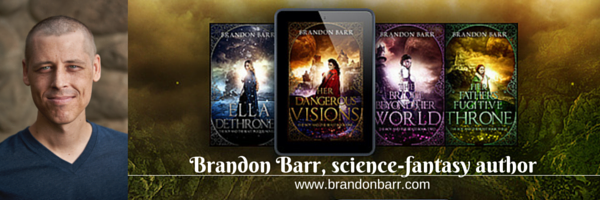
HER DANGEROUS VISIONS — EXCERPT
Chapter 1
AVEN
Aven glared at his twin sister. Why did she insist her visions remain a secret?
Winter was seated beside him at the table, opposite their parents. She was hunched over a bowl of dark amber broth, eating contentedly, as if the evening were any other.
Usually her revelations were insignificant, random—birds making a nest above a neighbor’s hovel, the promise of coming rain, Father grabbing Mother’s backside behind the sape vines—but Winter’s visions had turned dark again. She told him of little yellow ants coming up from the baseboards of a white plaster wall. The ants, she said, were hungry and had caught the scent of blood. That was strange. The farm hovels in the valley were underground with only rock and dirt for walls and floor. The ominous image was the second one that week, but not the worst of the two. Darker was the vision of dead bodies she had five days earlier.
Winter put the bowl down and hummed a short, satisfied melody. Her gaze lifted to meet Aven’s. Her lips held straight while she tried to reassure him with her eyes.
Winter’s hand found his under the table and her fingers tapped out a silent language, one they had created as children to keep secrets. “Stop. You may bring it to pass.”
Aven stared at his soup. It was the dreaded phrase she used to paralyze him.
In four days, their family would be running for their lives, and she wanted him to keep her gruesome vision silent? What if her vision was a warning, but they did nothing? Their escape and the images Winter saw in the eye of her mind had to be connected. The one thing that held his mouth shut was her logic. As twisted as it seemed to him, it felt possible.
For good or for bad, to tell is to change the future. By telling, we may bring it to pass.
Those words were a noose around his neck.
Aven’s father pushed away from the table, and the grinding of the chair legs chased away Aven’s dark thoughts. “We have nothing to fear but fear,” said Father. “A few more days of this and then we’ll be gone. The Baron’s watchers haven’t caught wind of anything. Bike still hasn’t the slightest suspicion. Like I said, nothing to fear. We’ll all get our appetites back again.”
“Winter never lost hers, said Aven.
His sister smirked. “You’re only nervous because you’re seeing Harvest tonight.”
He bent a withering eyebrow at his sister and harshly tapped out, “Mouth shut. You’ll feel the same one day.”
“Until the I get to hound you. Practice kissing your hand today?”
Thinking of Harvest added one anxiety atop another. When it came to Harvest, it wasn’t fear that pressed upon him, but the weight of knowing she was a more worthy girl than he deserved. What did he have to offer other than his devotion? She seemed happy to be matched with him, as if his faithfulness was enough, but he wanted to give her more. He felt like a brook beside a powerful river. She was mature, and that only served to make her beauty all the more radiant to jim.
And tonight—tonight was special. It was the third day of nuptials, and he’d clumsily transgressed them the day before?
“Twelve more days until you’re wedded,” said Mother rising rom her chair. She stood beside Father. The stress lines were gone from her face. “That means tonight is First Kiss.”
Aven nodded with a stiff smile.
“She was my first choice,” continued his mother, and Aven knew by her tone she was about to say what she always said as a wistful smile pinched her cheeks. “She is a hard worker. Runs double shifts when her mother is sick, and is just as productive in the field as the best pickers in our plot. I never hear her complain. Just like her parents. And she’s god-touched in beauty. Her father wanted you or no one. That’s what he told me.”
Winter smirked at Ave and scooped up her soup bowl. “It sounds like Father’s going to have a hard time finding me a mate to match Aven’s.”
Father winked at her, then took Mother’s hand. “We can talk of weddings and matchings tomorrow.”
Aven’s parents ascended the ladder to ground level. The large hatch that led outside was embedded at the foot of the old bulge oak. The massive root structure covered the ceiling of the main room. Ornate, meandering patterns curled and stretched down along the walls and spread throughout the small sleeping spaces in the hovel. The roots of the bulge oaks drank in the rain and kept their home dry and, underground, the heat of the summer was kept at bay and the cold of winter lost its sting. The farm hovels were not large, but they were cozy, comfortable.
His mother looked back down through the opening. “You sure you don’t want to come with us?”
“I want to walk alone,” said Aven.
The moment the hatch closed, Winter slipped into her room.
Aven followed after her with his thoughts churning. Harvest’s parents were hosting the meeting tonight. A member of the Erdu had passed information to Sky, Harvest’s mother. The Erdu were the key to surviving. They knew the forest. They knew how to elude the hired trackers that were sure to pursue them. The Baron maintained his power only if he held a grip of fear over the farmers.
– – – – –
AUTHOR BIO
 Brandon Barr is an American author living in Southern California. He writes in the genres of science fiction and fantasy and often combines the two, preferring stories where the science is soft, the fantastic is vivid, and the flesh and soul characters are front and center.
Brandon Barr is an American author living in Southern California. He writes in the genres of science fiction and fantasy and often combines the two, preferring stories where the science is soft, the fantastic is vivid, and the flesh and soul characters are front and center.
The Song of the Worlds Saga is his breakout, genre-blending science-fantasy drama set in a vast fantasy universe where elements of science fiction are dominated by gods and monsters, visions and gifts. For updates on new releases, promos, freebies and giveaways, subscribe to his mailing list and connect with him at www.brandonbarr.com
In his words: “I grew up reading an eclectic mix of Michael Crichton, Ray Bradbury, and Orson Scott Card. Crichton taught me how to write twisted plots and gave me a taste for suspense and goosebumps. Bradbury taught me the beauty of language and that prose can be gorgeous without turning purple. Card showed me the heart and longings of real characters, and turned my spirit toward fiction that is deep, gritty, and unafraid to dig into the depths of the human soul.
That mix makes up most of the speculative fiction I write.”
EDITOR’S NOTE: Brandon has been battling leukemia for the last several years. I know he and his family would appreciate your prayers.



































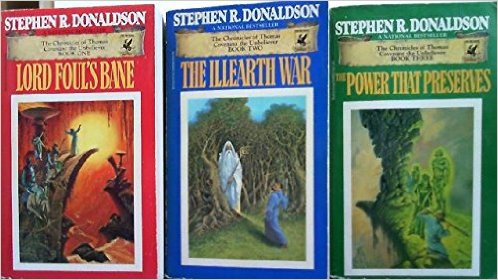
 A somewhat oversimplified way to make the same point is by comparing fantasy to realistic, mainstream fiction. In realistic fiction, the characters are expressions of their world, whereas in fantasy the world is an expressions of the characters. Even if you argue that realistic fiction is about the characters, and that the world they live in is just one tool to express them, it remains true that the details which make up their world come from a recognized body of reality—tables, chairs, jobs, stresses which we all acknowledge as being external and real, forceful on their own terms. In fantasy, however, the ultimate justification for all the external details arises from the characters themselves. The characters confer reality on their surroundings.
A somewhat oversimplified way to make the same point is by comparing fantasy to realistic, mainstream fiction. In realistic fiction, the characters are expressions of their world, whereas in fantasy the world is an expressions of the characters. Even if you argue that realistic fiction is about the characters, and that the world they live in is just one tool to express them, it remains true that the details which make up their world come from a recognized body of reality—tables, chairs, jobs, stresses which we all acknowledge as being external and real, forceful on their own terms. In fantasy, however, the ultimate justification for all the external details arises from the characters themselves. The characters confer reality on their surroundings. Does that mean others will likely not be able to relate because their circumstances are too different? Not at all. The miraculous and the amazing is a reflection on God and something all of us can understand and appreciate. When I hear of someone coming to Christ because of the witness of little old Dutch lady in a Nazi concentration camp, or of an orphan in India becoming a believer because of a stubborn, tough minded maiden lady, or of an entire people group in the Amazon jungle turning to Christ because of the testimony of two widows of the men they murdered, I don’t think the stories have nothing to do with me or nothing to say to me.
Does that mean others will likely not be able to relate because their circumstances are too different? Not at all. The miraculous and the amazing is a reflection on God and something all of us can understand and appreciate. When I hear of someone coming to Christ because of the witness of little old Dutch lady in a Nazi concentration camp, or of an orphan in India becoming a believer because of a stubborn, tough minded maiden lady, or of an entire people group in the Amazon jungle turning to Christ because of the testimony of two widows of the men they murdered, I don’t think the stories have nothing to do with me or nothing to say to me. 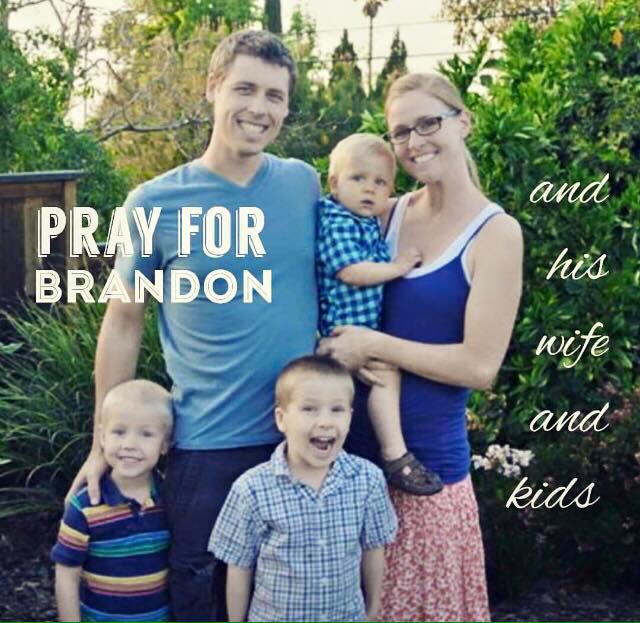


 Brandon Barr is an American author living in Southern California. He writes in the genres of science fiction and fantasy and often combines the two, preferring stories where the science is soft, the fantastic is vivid, and the flesh and soul characters are front and center.
Brandon Barr is an American author living in Southern California. He writes in the genres of science fiction and fantasy and often combines the two, preferring stories where the science is soft, the fantastic is vivid, and the flesh and soul characters are front and center.

 Science fiction is becoming more ambitious as the secrets of the universe are uncovered. Going to the moon is so last century. Serious efforts are now underway for exploration and even colonization of Mars, and Europa remains a consistent possibility of extraterrestrial biology (and was the backdrop for an excellent movie). There is admittedly bizarre talk of “alien megastructures” and cinematic wormhole travel has progressed from the trippiness of 2001: A Space Odyssey to the moderately scientific space tunnels of Interstellar. We are still bound to this decaying planet but our minds and imaginations sail past the galaxies in ways that seem almost tangibly real.
Science fiction is becoming more ambitious as the secrets of the universe are uncovered. Going to the moon is so last century. Serious efforts are now underway for exploration and even colonization of Mars, and Europa remains a consistent possibility of extraterrestrial biology (and was the backdrop for an excellent movie). There is admittedly bizarre talk of “alien megastructures” and cinematic wormhole travel has progressed from the trippiness of 2001: A Space Odyssey to the moderately scientific space tunnels of Interstellar. We are still bound to this decaying planet but our minds and imaginations sail past the galaxies in ways that seem almost tangibly real.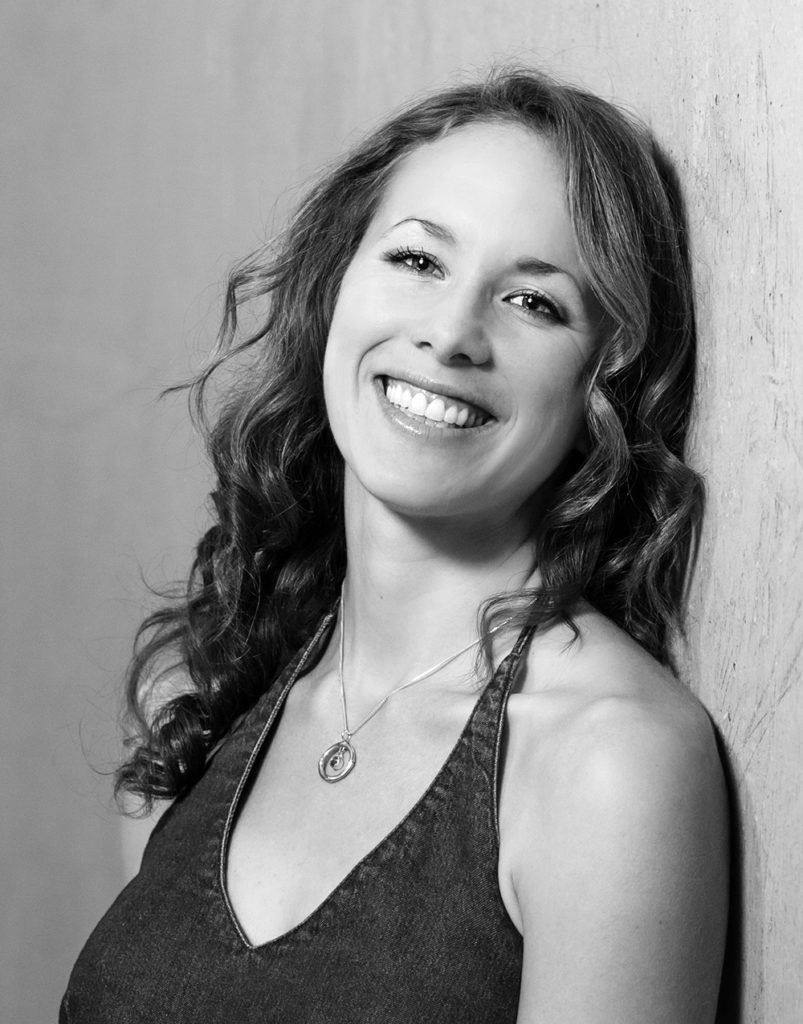

 C.A. Gray is the author of the YA Fantasy PIERCING THE VEIL trilogy, as well as the NA Dystopian series, THE LIBERTY BOX. By day, she is a Naturopathic Medical Doctor (NMD), with a primary care practice in Tucson, AZ. Additionally, she writes medical books under her real name. To learn more about her medical practice, please visit drlaurendeville.com.
C.A. Gray is the author of the YA Fantasy PIERCING THE VEIL trilogy, as well as the NA Dystopian series, THE LIBERTY BOX. By day, she is a Naturopathic Medical Doctor (NMD), with a primary care practice in Tucson, AZ. Additionally, she writes medical books under her real name. To learn more about her medical practice, please visit drlaurendeville.com.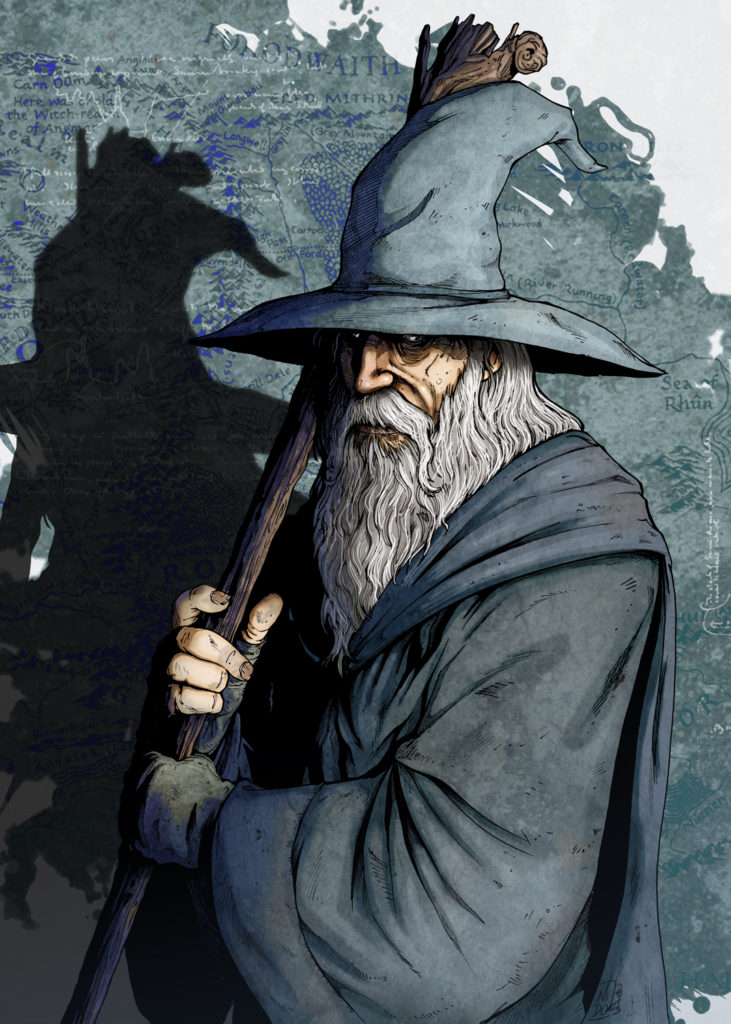
 Will Space Drifters by Paul Regnier (Enclave Publishing), with all its outer space and alien planet adventures, ever make it to the big screen? Or what about Tom Pawlick’s mysterious, creepy supernatural suspense,
Will Space Drifters by Paul Regnier (Enclave Publishing), with all its outer space and alien planet adventures, ever make it to the big screen? Or what about Tom Pawlick’s mysterious, creepy supernatural suspense, 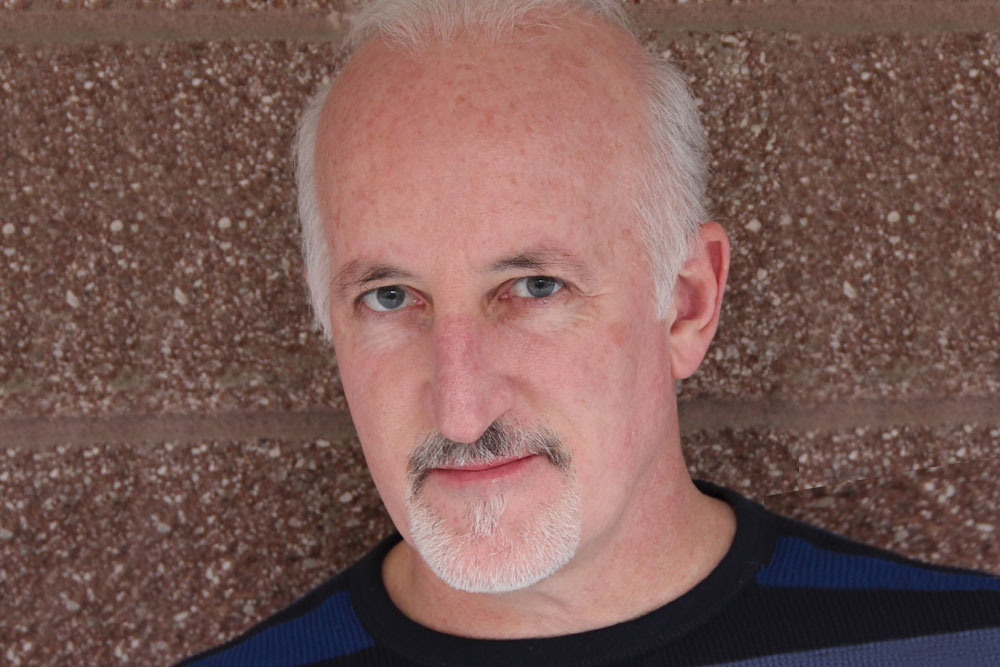



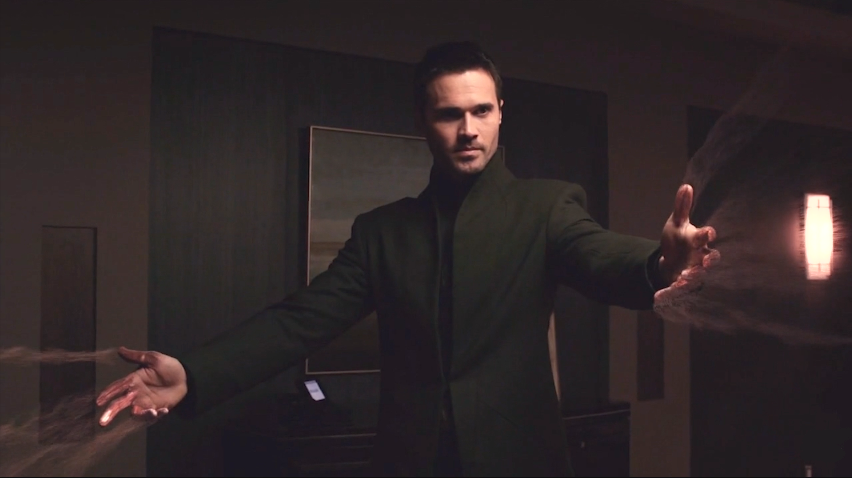

 its billing, though in less than exemplary fashion. I would like to examine this, not for the sake of the movie itself so much as for the larger points of complexity and ambiguity in stories.
its billing, though in less than exemplary fashion. I would like to examine this, not for the sake of the movie itself so much as for the larger points of complexity and ambiguity in stories. It may even be the opposite of it, to the extent that it is simply a muddying of the waters. True complexity requires greater clarity and more distinction, and it doesnât discard simplicity.
It may even be the opposite of it, to the extent that it is simply a muddying of the waters. True complexity requires greater clarity and more distinction, and it doesnât discard simplicity.


